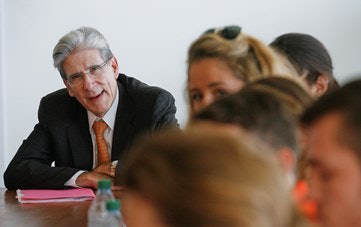
“Miami is one of the most diverse cities [in the country] and having a great university in the heart of a global city like Miami offers all kinds of opportunities,” says Frenk.
Frenk is a fourth-generation physician with a remarkable career in health policy. One of his notable accomplishments is establishing Seguro Popular—a comprehensive national health insurance program—while serving as the minister of health for Mexico from 2000 to 2006.
When he assumed the position, half of Mexico’s population of roughly 100 million people was uninsured. “It was a terrible situation because people had to face this horrible choice between watching a loved one suffer or spending everything they have to pay for health care,” says Frenk.
The policy had to be approved by Mexico’s dominant political parties: the National Action Party (PAN), the Party of the Democratic Revolution (PRD) and the Institutional Revolutionary Party (PRI).
“I always say that good policy has three pillars: technical, ethical and political,” says Frenk.
The technical pillar was diagnosing the problem through research, then showing that the solution was feasible and affordable.
The ethical pillar told the importance of the program, which was very simple, says Frenk: “It’s unacceptable in a society to have children and adults dying from causes that can be prevented. We should think of access to high-quality health care as a basic right of the people and not as a privilege that you access because you have money.”
The political pillar was achieved with more than 90 percent approval of Seguro Popular by the Mexican Senate and more than 75 percent of approval in the lower house. Within a year and a half of passing the law, every state had signed on to the new insurance, says Frenk.
Personally, this feat for Frenk was a repayment to his native country.
“I’m the child of immigrants—my father and his family immigrated to Mexico from Germany escaping the Nazi regime. When they were faced with persecution, they went to a country that was poorer in resources, but much richer in terms of tolerance and embracing diversity. So I always had a very strong sense of debt to Mexico because literally that country saved my family’s life and, thanks to that, I’m alive now,” he says.
As a child, Frenk was not only influenced to enter a career in medicine by his father, who exposed his children to his work at a young age, but by a personal experience. The summer after his junior year in high school, he traveled to Chiapas—one of Mexico’s poorest states. There, he encountered a grandmother with a head wound, carrying a sick child. After walking hours to the nearest clinic, the physician was not there and she was left with no medical assistance.
“I found this horrible sense of not being able to do anything to help her and it was at that point I [told] myself I’m going to serve people and study medicine,” says Frenk. “Then, once in my studies, I always had this interest in social issues, so I found that public health allowed me to combine the two.”
Frenk earned a medical degree from the National Autonomous University of Mexico in 1979. He then attended the University of Michigan, where he earned a master’s in public health in 1981, a master’s in sociology in 1982, and a Ph.D. in both medical care organization and sociology in 1983.
His professional résumé is complete with monumental positions. He was founding director general of the National Institute of Public Health in Mexico, serving from 1987 to 1992, and executive director in charge of evidence and information for policy at the World Health Organization from 1998 to 2000. From 2007 to 2008, he served as a senior fellow in the Global Health Program of the Bill & Melinda Gates Foundation as well as executive president of the Carso Health Institute in Mexico City.
In 2009, Frenk became dean of the faculty at the Harvard School of Public Health and T & G Angelopoulos Professor of Public Health and International Development, a joint appointment with the Harvard Kennedy School of Government.
“What I have done in my approach to academic life is to think that universities have one single product—that’s knowledge,” he says. “Knowledge is the most powerful instrument we have to produce enlightened, social, positive change. I think of universities as engaged in a circle of knowledge that starts with the creation of new knowledge—that’s what we do with research. … It continues with the re-creation of that knowledge—that’s what we do with good education—and then continues with the translation of knowledge into technologies, drugs, vaccines, policies and programs.”
At Harvard, Frenk says he placed an emphasis on personally transmitting knowledge to students by establishing office hours and continuing to teach.
“I intend to do the same thing at the University of Miami, maybe not the first year; there are lots of things I need to learn as the new president. But I hope that in my second year I’ll start teaching again. I’m very excited about the contact with students; it’s a very energizing experience to see young people who literally embody their futures.”


















